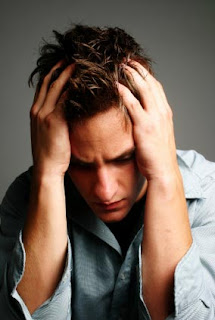Home » Symptoms » Panic Disorder Result from Having Panic Attacks - Symptoms
Friday, June 11, 2010
Panic Disorder Result from Having Panic Attacks - Symptoms
 |
| Panic Disorder Symptoms |
Each panic attack peaks within about 10 minutes (From American Psychological Association APA). Sometimes attacks repeat in clusters for up to an hour after the initial attack, with associated fear over the possibility of another attack. The Subsequent attacks may occur days and even weeks later.
This element of fearfulness is called anticipatory anxiety. People fear having another attack while performing the same activity or being in the same situation as when a previous attack occurred. Anticipatory anxiety can be so extreme that people turn away from the outside world for fear that another attack will be set off.
Exp: "If an attack occurred while driving on the freeway, a person may fear that repeating this type of driving will cause panic again. He will, then, limit himself to driving only on secondary roads."And If an attack was experienced outside while walking through a park or shopping at a mall, a fear of having a future attack in public can occur. it can lead to complete avoidance of any outside activity, which can result in a condition called agoraphobia the inability to go beyond known and safe surroundings because of intense fear and anxiety.
Panic disorder can also happen with other disorders. Depression and substance abuse commonly occur simultaneously with panic disorder. About 30% of people with panic disorder abuse alcohol and 17% abuse drugs, such as cocaine and marijuana. This drug abuse can be attributed to unsuccessful attempts by a person with panic disorder to alleviate the anguish and distress caused by his condition. According to the National Institute of Mental Health (NIMH)
NIMH Produce effective treatments to help people with panic disorder. Treatment includes medication and a type of psychotherapy known as cognitive behavioral therapy.
Appropriate treatment by an experienced professional can reduce or prevent attacks in 70% to 90% of people with panic disorder. Most people show significant progress after a few weeks of treatment. Relapses can occur, but they can often be treated effectively.
Symptoms of Panic Disorder
There r more than a dozen physical or emotional sensations that a person can experience during a panic attack. Not everyone experiences all of them, and people with panic disorder may report different feelings when having an attack.
Panic disorder can be devastating because it can interfere with relationships, schoolwork, employment and normal development. It's not uncommon for a person with panic disorder to experience an anxious feeling even between attacks. People with panic disorder will begin to avoid situations where they fear an attack may occur or situations where help might not be available. This happens with both adults and children with panic disorder.
Exp: "a child may be reluctant going to school or be separated from her parents. Not all children who express separation anxiety do so because they have panic disorder, and it can be very difficult to diagnose. But when properly evaluated and treated with a combination of medication and cognitive behavioral therapy, children with panic disorder usually respond well. It is recommended that a family physician evaluate children and adolescents with suspected panic. If no other physical illness or condition is found as a cause for symptoms, a comprehensive evaluation by a child and adolescent psychiatrist should be obtained."
Questions formulated can help an individual determine whether he is experiencing panic disorder :
- Are you troubled by repeated and unexpected “attacks” of intense fear or discomfort for no apparent reason?
- Do you experience at least four of the following symptoms? Pounding heart, sweating, trembling or shaking, shortness of breath, choking, chest pain, nausea or abdominal discomfort, dizziness, a feeling of unreality or being detached from yourself, fear of losing control, going crazy, fear of dying, numbness or tingling sensations or chills or hot flashes.
- Do you have a fear of places or situations where escape or getting help might be difficult, such as a crowded room or traffic jam?
- Do you have a fear of being unable to travel without a companion?
- For at least one month following an attack, have you felt persistent : concern about having another attack?, worry about going crazy?, need to change your behavior to accommodate the attack?
People often are convinced during the attack that they are dying and describe a panic attack as the most distressing experience that they have ever had. As a natural response, people dread the next attack and often avoid places or situations where they have had panic attacks.
Panic Disorder Symptoms

